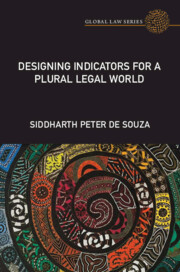Book contents
- Frontmatter
- Dedication
- Contents
- Acknowledgements
- 1 Introduction
- 2 ‘Meanings’, ‘Trust’ and ‘Power’: Critical Perspectives on Legal Indicators
- 3 Rule of Law Promotion, Legal Indicators and Legal Pluralism
- 4 Epistemic Diversity and Voices from the Global South: Countering the Managerial Implications Of Measuring Justice
- 5 A Capability Approach to Access to Justice in Plural Legal Systems
- 6 Conclusion
- Appendix
- Bibliography
- Index
1 - Introduction
Published online by Cambridge University Press: 29 July 2022
- Frontmatter
- Dedication
- Contents
- Acknowledgements
- 1 Introduction
- 2 ‘Meanings’, ‘Trust’ and ‘Power’: Critical Perspectives on Legal Indicators
- 3 Rule of Law Promotion, Legal Indicators and Legal Pluralism
- 4 Epistemic Diversity and Voices from the Global South: Countering the Managerial Implications Of Measuring Justice
- 5 A Capability Approach to Access to Justice in Plural Legal Systems
- 6 Conclusion
- Appendix
- Bibliography
- Index
Summary
A multi-stakeholder Task Force on Justice that brought together United Nations (UN) member states, civil society and international organizations in 2019 released a report that estimated a global justice gap of 5.1 billion people. This number, which makes up over two-thirds of the world's population, was estimated to be of those people who are without meaningful access to justice. The gap has three dimensions that looked at the living conditions of people, matters of dispute resolution and opportunity deprivation to lead a secure life. First, at least 253 million people live in conditions of extreme injustice, of which 12 million are stateless, 40 million work in conditions of modern slavery and 203 million live in conditions of such insecurity that it is difficult to pursue justice. Second, over 1.5 billion people are unable to resolve their justice disputes on account of challenges of the civil or administrative system or unresolved criminal matters. Third, over 4.5 billion people are excluded from political, economic and social opportunities that are provided by the law on account of being unable to access a legal identity, lack of land tenure and informal employment. These are startling figures, which indicate the sheer magnitude of the challenge that confronts those working to address barriers to access to justice. This large exercise also demonstrated a move towards quantifying justice, as a method to articulate these barriers in order to emphasize the urgency for action. Rule of law indicators and measurement frameworks have become increasingly popular and widely used to evaluate the capacities of legal systems. This is so because inter alia, indicators are seen to increase the diagnostic capacity of policy makers to identify bottlenecks in the legal system, enable empirically based solutions for justice reform, and enhance the capacity of civil society to monitor justice delivery. By examining regional variations among various legal systems, analysing elements of state practice and law making, and drawing linkages between access to justice, good governance and democratic validity, these indicator frameworks speak to the question: is the rule of law increasing globally? Through the data collected and subsequently analysed, these indicators are used to indicate and signal a way to assess the state of justice and legal institutions around the world.
- Type
- Chapter
- Information
- Designing Indicators for a Plural Legal World , pp. 1 - 19Publisher: Cambridge University PressPrint publication year: 2022



